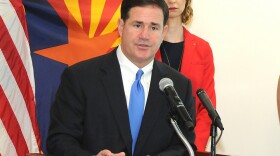By Howard Fischer
Capitol Media Services
PHOENIX -- Saying some landlords are weighing evictions, Gov. Doug Ducey on Monday ordered judges around the state to immediately suspend such legal actions against commercial tenants affected by the pandemic.
The order says commercial lands must consider deferring rent payments for those who cannot pay the bill due to the financial hardship due to COVID-19. And it encourages landlords to work with tenants to waive late fees, penalties and interest due to late payments as well as develop repayment plans.
But the hammer is the governor's directive to the courts that "a commercial eviction action including lock out, notice to vacate, or any other attempt to inhibit the operations of a business shall be temporarily suspended for tenants unable to pay rent due to financial hardship caused by the COVID-19 pandemic.''
The only exception in Ducey's order is in cases where one of the parties determines that staying any eviction action is "contrary to the interest of justice.'' His order does not spell out what that includes.
Ducey's order, which covers small businesses -- those up to 500 employees -- is effective through the end of May.
His directive comes nearly two weeks after a similar executive order dealing with residential rentals. But there is a crucial difference.
In that order, Ducey barred police officers and constables -- arguably members of the executive branch which he heads -- from carrying out eviction orders under certain circumstances.
These orders on residential evictions involve people who are required to be quarantined based on a diagnosis of COVID-19 or has been ordered to self-quarantine by a licensed medical professional based on symptoms. Evictions also can be avoided if someone else living in the home is diagnosed with the virus or has some condition "that makes them more at risk for COVID-19 than the average person.''
And there are financial triggers, with evictions precluded for anyone who suffers a "substantial loss of income'' linked to the virus.
This order, by contrast, direct judges who are members of the judicial branch of government on what they may and may not do.
Asked where Ducey gets that power, gubernatorial press aide referred solely to the state law that deals with emergencies. But he did not cite any specific provision giving the governor power over the judiciary.
Aaron Nash, spokesman for the Arizona Supreme Court, said there is no concern on the part of the justices that Ducey has tread into their area of jurisdiction. The key, he said, is the part of the governor's order allowing judges to determine what is in the "interest of justice.''
"The judges still have discretion on what justice requires,'' said Nash. "They're entering administrative orders and making operational changes along those lines, in addition to orders in individual cases.''
There are some parallels with the earlier order on residential evictions. This new order does link a commercial tenant's financial problems to COVID-19.
But there are not specific triggers. Instead, it says that a tenant who cannot pay must first notify the landlord or property owner in writing and furnish "any available supporting documentation of their inability to pay rent'' due to a temporary financial situation.
Tenants also have to acknowledge that the lease contract remains in effect.
It does spell out that tenants who get any form of public financial assistance must apply "a portion'' to any current or past-due rents. That includes a portion of the $2 trillion federal relief package which allows businesses with fewer than 500 employees to get Small Business Administration loans ot only for payroll but also rent, utilities and mortgage interest.
But the order spells out that landlords cannot require that tenants give them any specific percentage of the outside aide they get.
Farrell Quinlan, executive director of the Arizona Building Owners and Managers Association, said the order is, in many ways, not a surprise. He said the governor has been working for some time now with his organization as well as other groups that represent various segments of the commercial real estate industry.
And he said that much of what the governor wants already is being addressed.
"There's a lot of forbearance going on out there,'' Quinlan said. "And there's a lot of working with our tenants.''
But what the order does not defer, Quinlan said, are the financial obligations of the landlords.
"Are the banks and the lenders that we have to answer to for our bills, are they going to show a similar forbearance with our obligations?'' he asked.
In his new order, the governor says lenders that have provided commercial mortgage loans "shall consider'' providing an opportunity for borrowers to defer those payments.
Ducey previously provided some temporary financial relief, at least for bar and restaurant owners: They can defer for 90 days the fees they owe the state for their liquor licenses.
-30-
On Twitter: @azcapmedia








